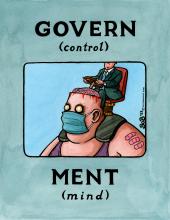2024-02-17
This is not party-political (in the sense of one political party competing against another).
It is party-political in the sense that the concept of "the political party" has been and is still weaponised against the demos in order to invert the official relationship - so that the people become the servants of the government rather than vice versa.
It is the case that most recent Acts of Parliament already give ministers the power to vary or remove existing clauses and insert new clauses without necessarily having to submit their suggestions for debate in Parliament. It is sufficient to publish the proposals to MPs, who need to demand a debate within a short time frame in order to get one. Since MPs are busy people who don't necessarily want to "rock the boat", these changes may well be allowed through without debate.
Technically therefore such Acts of Parliament may be very significantly updated, without effective scrutiny, since ministers may make use of this delegated authority.
We are also familiar with the ways in which we are governed by "arms length" and "independent" regulators (Ofcom, Ofwat, Of<insert your TLA here> not to mention a veritable plethora of "independent" financial (FCA etc) and "health" (MHRA JCVI etc) regulators and the Electoral Commission) that supposedly all have the public's interests at heart.
These bastions of the Establishment however, being one or more levels removed from government, effectively become (some believe) a law unto themselves, especially as they are invariably described as "independent" and get little attention from that other bastion of "independence", the Press.
Getting them to change their unresponsive ways is an inherently byzantine if not impossible task, usually requiring a great deal of public exposure about some outrageous untenable situation that is clearly not in the public interest.
None of this leads to improved public confidence in the mechanisms by which we are governed.
Given the dire state of British politics, currently coincident with a looming General Election, it is appropriate to consider where our potential next prime minister Sir Keir may stand, at the very pinnacle of this regulatory pyramid.



